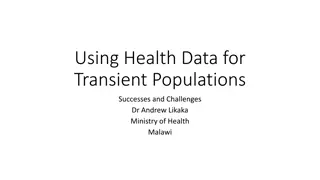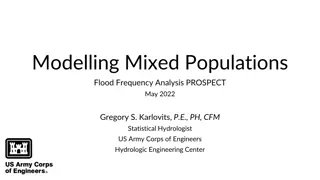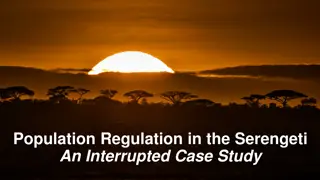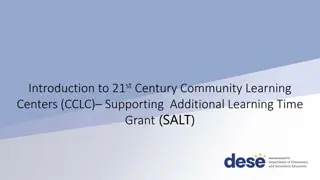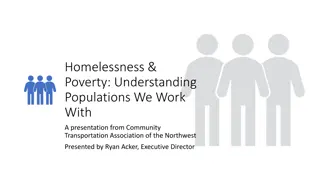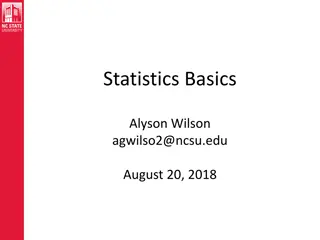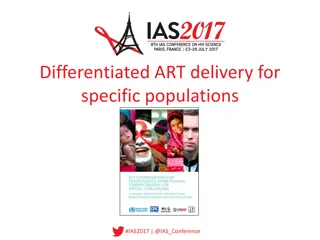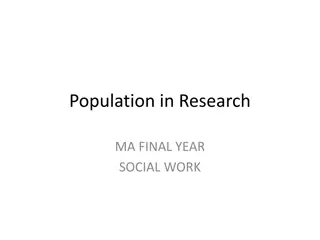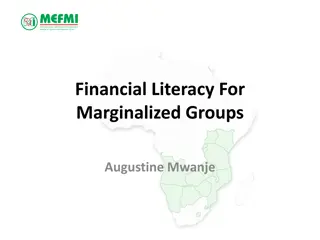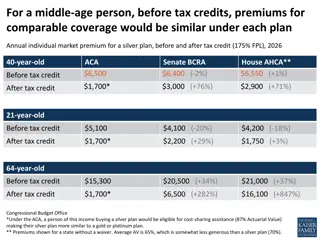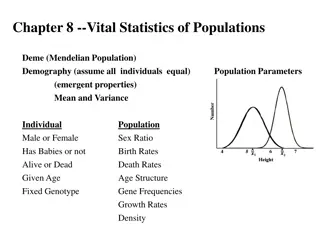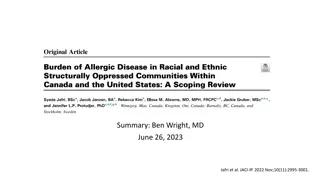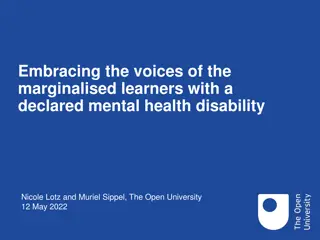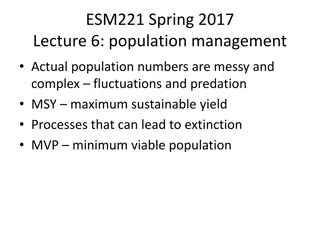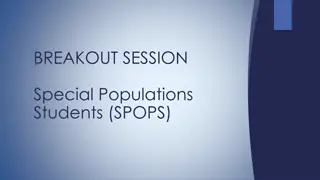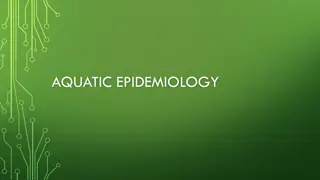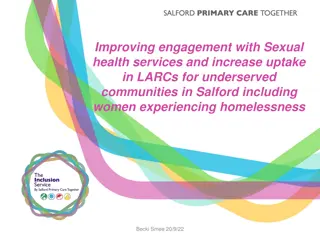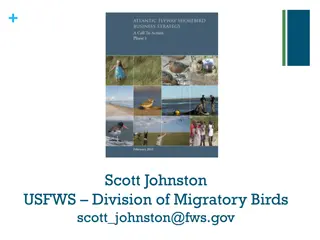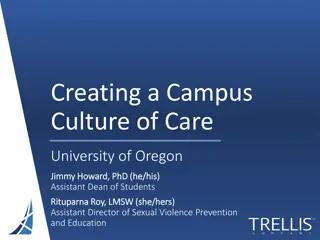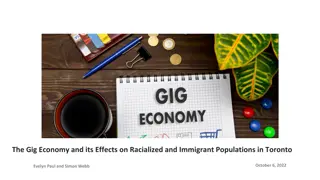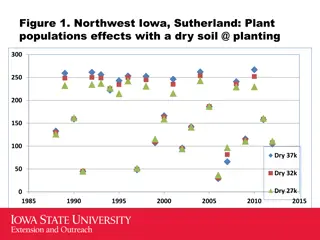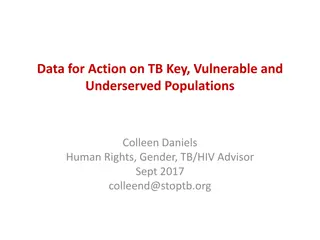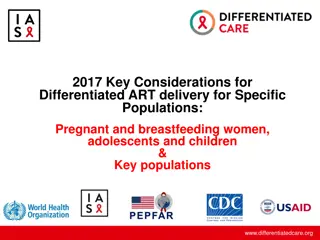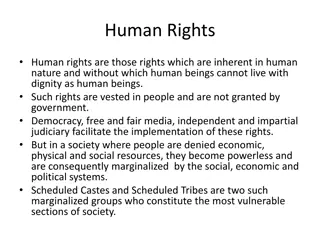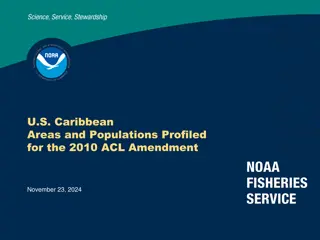Community-Based Participatory Research for Hard-to-Reach Populations: A Collaborative Approach
This presentation focuses on community-based participatory research for hard-to-reach populations, particularly on implementing harm reduction strategies for amphetamine-type stimulant (ATS) use. It addresses community engagement, outreach to hidden sites, societal perceptions of drug use, and the c
0 views • 25 slides
2024-2026 VOCA Grant Application Details and Opportunities
Learn about the 2024-2026 VOCA grant application process, important dates, funding availability, areas of emphasis, and access to the RFP on the ICJI website. Explore how federal criminal cases fund the Crime Victims Fund and the significance of supporting programs in community violence intervention
1 views • 35 slides
Fostering Openness in ODL for Marginalized Students
Student access and success in universities, especially for marginalized populations, is a complex issue in South Africa. This study by Dr. Alice Mkuzangwe from the University of South Africa explores the dimensions of openness in Open and Distance Learning (ODL) and identifies factors affecting marg
1 views • 29 slides
Exploring Economics and Climate Change Impacts on Marginalized Groups
In this lesson plan, students delve into the relationship between economics and climate change, focusing on the effects on marginalized communities. Through interactive tasks and discussions, they analyze pricing strategies, consider the impact of price hikes on various goods, discuss government sch
4 views • 21 slides
Enhancing Health Data Usage for Transient Populations in Malawi
Exploring the challenges and successes in using health data for transient populations in Malawi, this presentation covers migration trends, potential opportunities, and recommendations for data use and exchange. Case studies illustrate the complexities of managing health data for mobile populations,
1 views • 15 slides
Understanding Populations: Factors Affecting Growth and Dynamics
In the study of populations, factors like carrying capacity, density-dependent, and density-independent growth play crucial roles. Learn about estimating population size, dispersion patterns, growth rates, and more to understand how populations change over time.
0 views • 25 slides
Understanding Mixed Populations in Flood Frequency Analysis
In this presentation by Gregory S. Karlovits, P.E., PH, CFM, a statistical hydrologist from the US Army Corps of Engineers, the focus is on modelling mixed populations in flood frequency analysis. The key topics include revisiting the IID assumption, identifying mixed populations, and building model
0 views • 38 slides
Population Regulation in the Serengeti: An Interrupted Case Study
Explore the fascinating dynamics of population regulation in the Serengeti National Park through a series of slides covering factors influencing wildlife populations, such as bottom-up and top-down controls, density-dependent and independent factors, and the impact of diseases like rinderpest on mig
0 views • 20 slides
Enhancing Learning Opportunities through 21st Century Community Learning Centers (CCLC) Grant
The 21st Century Community Learning Centers (CCLC) grant program, part of the Every Student Succeeds Act, supports additional learning time for students through enriching programs. These programs aim to increase engagement, provide a well-rounded education, and empower diverse student populations. G
0 views • 24 slides
Understanding Populations in Homelessness and Poverty Presentation
This presentation by the Community Transportation Association of the Northwest, presented by Ryan Acker, delves into the importance of understanding homelessness and poverty. It highlights the challenges faced by vulnerable populations, such as homeless individuals, those living in poverty, people w
0 views • 53 slides
Understanding Ecological Organization in the Environment
Explore the relationships among organisms within populations, communities, ecosystems, and biomes. Delve into the levels of organization in different environments, from populations to the biosphere. Learn about primary and secondary succession, pioneer species, and how environments form. Discover th
1 views • 19 slides
Understanding Basic Concepts in Statistics
This content covers fundamental concepts in statistics such as populations, samples, models, and probability distributions. It explains the differences between populations and samples, the importance of models in describing populations, and discusses various distributions like the normal and Poisson
0 views • 42 slides
Optimizing Antiretroviral Therapy Delivery for Specific Populations
Tailored antiretroviral therapy (ART) delivery models benefit stable patients by addressing inequities and involving key populations. Differentiated care extends to adolescents, pregnant women, and key populations, emphasizing psychosocial support. Transitioning between client categories is crucial
0 views • 6 slides
Understanding the Concept of Population and Unit Stock
The concept of population revolves around all organisms of the same species living in a specific area capable of interbreeding. It is essential to differentiate between sample populations and real populations to accurately study their attributes such as birth rates, death rates, and spatial dimensio
0 views • 15 slides
Understanding Research Populations in Social Work Studies
Research populations in social work studies play a crucial role in forming the basis for data collection and analysis. The definition, types (target and accessible populations), and challenges faced by researchers in testing entire populations are explored in this informative content.
0 views • 5 slides
Financial Literacy Initiatives for Marginalized Groups in Eastern and Southern Africa
This presentation by the Macroeconomic and Financial Management Institute delves into the importance of financial literacy for marginalized groups such as women, youth, rural populations, the elderly, and the disabled in Eastern and Southern Africa. It emphasizes the need to identify and support the
0 views • 18 slides
"Changing Futures Programme: Empowering Vulnerable Communities in Leicester
Serving marginalized populations in Leicester, the Changing Futures Programme by Leicester City Council targets individuals facing multiple disadvantages, including women in sex work, homelessness, recent Criminal Justice System involvement, and complex mental health issues. The program operates wit
0 views • 9 slides
Higher Premium Impact on Older and Low-Income Populations Under BCRA
Premium comparisons reveal that low-income, older adults face substantial increases in premiums under the Senate BCRA compared to the ACA. States with older, lower-income, and rural populations would experience over 100% higher average premiums under the BCRA. The BCRA could result in significant di
2 views • 5 slides
Understanding Vital Population Statistics and Demography
Exploring vital statistics of populations with a focus on Mendelian populations and demography, analyzing factors like sex ratio, birth rates, death rates, age structure, gene frequencies, growth rates, and population density. The content delves into emergent properties, mean and variance population
0 views • 9 slides
Understanding Racial Disparities in Allergic Diseases: A Scoping Review
Social determinants of health impact chronic illnesses, with racial and ethnic groups facing barriers to care. This scoping review explores disease burdens in understudied populations, highlighting disparities in allergic diseases affecting marginalized groups like Black and Indigenous communities.
0 views • 10 slides
Understanding the Experiences of Marginalized Learners with Mental Health Disabilities
This research project focuses on exploring the challenges faced by students with mental health disabilities in a design qualification. Through experiential interviews and empirical research, the aim is to develop recommendations to reduce the awarding gap and enhance progression for these learners.
0 views • 15 slides
Population Management and Sustainable Harvesting Strategies
Actual population numbers exhibit complex fluctuations influenced by predation and other factors. Understanding concepts like Maximum Sustainable Yield (MSY) and Minimum Viable Population (MVP) can help in managing populations effectively. The concept of MSY ensures the maximum harvest of a renewabl
0 views • 32 slides
Insights into Labour and Birth Among Marginalized Groups and Migrant Women
This content discusses new insights into socio-cultural phenomena surrounding labour and birth, particularly focusing on marginalized groups and migrant women. It includes details on sub-working groups, updates, and plans within this topic area, such as experiences of labour and birth, optimizing ch
0 views • 22 slides
Understanding Special Populations Students in CTE Programs
Students who have special learning needs are considered special populations students in CTE programs. They include individuals with disabilities, economically disadvantaged individuals, single parents, English Language Learners, migrants, homeless individuals, youth in foster care, and youth with pa
0 views • 9 slides
Understanding Aquatic Epidemiology in Fish Populations
Aquatic epidemiology is a crucial branch of science that focuses on describing the health, diseases, and welfare of fish populations. It involves studying diseases in wild and hatchery-raised fish, identifying factors influencing disease occurrence, and conducting diagnostic investigations to mainta
0 views • 12 slides
Enhancing Access to Sexual Health Services for Underserved Communities in Salford
Improving engagement with sexual health services and increasing uptake in LARCs for underserved communities in Salford, including women experiencing homelessness, through the dedicated efforts of the Inclusion GP Service. They work tirelessly to remove barriers to accessing healthcare for individual
0 views • 21 slides
Strategies for Recruiting Female Election Observers
Inclusivity is crucial in election observation initiatives to ensure representation of all citizens, including marginalized populations like women. Overcoming barriers to female participation requires proactive recruitment, understanding community-specific challenges, and engaging with various group
0 views • 11 slides
Challenges in Inner-City Education and Community Well-being
In the inner-city community, disparities in education, health, poverty, and employment are stark. Indigenous residents face lower graduation rates and life expectancy, while surveillance and racialized harassment perpetuate systemic injustices. Understanding these issues is crucial for creating posi
0 views • 30 slides
Addressing the Decline of Shorebird Populations in the Atlantic Flyway
The presentation focuses on the concerning decline in shorebird populations within the Atlantic Flyway, emphasizing the urgency for increased conservation efforts. It highlights specific species affected by the decline and proposes a comprehensive business strategy involving multiple partners to rev
0 views • 10 slides
Building a Campus Culture of Care at University of Oregon
Explore values contributing to a caring campus culture, trends in student mental health, stressors for marginalized populations, crisis intervention best practices, and roles in student support. Focus on boundary setting and self-care for practitioners with marginalized identities.
0 views • 43 slides
California HCBS 101 with COVID-19 Considerations Overview
This presentation discusses the importance of California's HCBS programs in addressing housing insecurity for individuals with disabilities and marginalized identities. It covers LTSS, Medicaid programs, HCBS waivers, and specific programs like Assisted Living Waiver and HCBA Waiver. Understanding t
0 views • 17 slides
Understanding the Impact of the Gig Economy on Marginalized Groups in Toronto
This report delves into the effects of the gig economy on racialized and immigrant populations in Toronto. It outlines research findings, stakeholder insights, and strategic recommendations to address the challenges faced by marginalized groups in the gig economy. The study aims to shed light on the
0 views • 25 slides
Upholding Dignity and Human Rights: A Mission for Equality and Justice
Working towards a just and humane Philippine society where all individuals have equal opportunities, live with dignity, and stand against oppression. As the conscience of the government and the people, the mission is to seek truth in human rights issues, raise awareness of rights, and advocate for t
0 views • 22 slides
Analysis of Plant Populations Effects in Various Regions of Iowa
The figures depict the impact of plant populations on yield in different regions of Iowa under dry soil conditions. The data spans several years, showing trends in plant populations and corresponding yields over time. Each figure focuses on a specific region, providing insights into agricultural pra
0 views • 8 slides
Understanding and Prioritizing Tuberculosis Key Populations for Action
This collection of resources explores the identification, understanding, and prioritization of key populations affected by tuberculosis (TB), focusing on vulnerable and underserved communities. It delves into the framework for structuring programs, factors contributing to disease burden, and a range
0 views • 8 slides
A Call to Serve: Serving the Marginalized and Vulnerable in Catholic Health Care
Catholic health care emphasizes serving society's most vulnerable, following a tradition dating back over 350 years. The Catholic Health Association of Ontario highlights a commitment to holistic care and compassion for marginalized populations, encouraging facilities to prioritize their needs. The
0 views • 58 slides
Key Considerations for Differentiated ART Delivery for Specific Populations
This collection of resources discusses key factors in differentiated approaches to HIV care, focusing on pregnant and breastfeeding women, adolescents, children, and key populations such as people who inject drugs, sex workers, men who have sex with men, transgender individuals, and those in prisons
0 views • 14 slides
Challenges in Protecting Rights of Marginalized Groups in India
Despite constitutional provisions and legal frameworks, marginalized groups such as Scheduled Castes and Scheduled Tribes in India continue to face exploitation, discrimination, and violations of their rights. Protective discrimination measures have been found insufficient in addressing the deep-roo
0 views • 15 slides
Understanding Marginalized Children: Issues and Concerns in Childhood Growth
Marginalized children are those confined to the fringes of society, denied access to mainstream opportunities. This group includes those with disabilities, health issues, poverty-stricken, and those from marginalized groups. They face discrimination, stigmatization, and limited opportunities, impact
0 views • 30 slides
U.S. Caribbean Areas & Populations 2010 Profile: Amendment Overview
The presentation outlines mandates under NEPA and Magnuson-Stevens Act for considering affected populations in U.S. Caribbean areas. It covers demographics, poverty rates, and racial populations, focusing on St. Croix, St. Thomas/St. John, and Puerto Rico.
0 views • 38 slides




